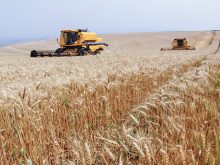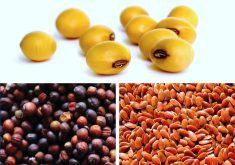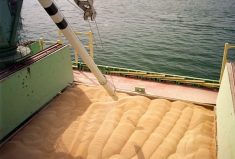“To do a business speculation with canola, simply sell the canola into the cash market and replace the volume on paper with an ICE canola futures position.”
This year’s canola crop came in late and was grown in conditions that varied considerably throughout the province. Now that the crop is in the bin, producers have to decide if it’s time to move unpriced canola.
“Conditions during the 2009 canola harvest varied as much as the growing season did,” says David Wong, with Alberta Agriculture and Rural Development. “Some of this year’s canola crop was harvested in record-high temperatures during September, with other harvesting done late in wet and muggy conditions. Now, with the crop harvested and stored, producers may not want to take a chance on spoilage. While canola may have gone in dry, a few hot spots in a bin can result in spoilage to more than just a couple of bushels.”
Read Also

Brazil muscles into wheat market
Glacier FarmMedia – Canadian wheat exporters are facing a new competitor in their second biggest market. “The rapid emergence of…
Business speculation may be a strategy producers should consider in years with such variable conditions. This year’s conditions include canola not in storable condition and belief that prices could improve.
“Producers can ‘business speculate’ with canola and possibly take advantage of these conditions,” says Wong. “To do a business speculation with canola, simply sell the canola into the cash market and replace the volume on paper with an ICE canola futures position.”
In simple terms, producers would haul their canola to a buyer (getting a price including a basis level), and then get the broker to buy the producer the equivalent amount of canola in the futures market.
“One of the advantages of this move is that it eliminates the possibility of the canola spoiling in bins because the physical canola has been sold to the local market,” says Wong. “The basis level has recently widened for canola. Until the Chinese blackleg situation occurred a few weeks ago, basis levels were very attractive. With the exception of domestic canola crusher basis levels, canola buyers who do export business have weakened their basis levels. Despite weaker current basis levels, ‘business speculation’ with canola is still a viable alternative marketing tool.”
Wong says keeping canola in the bin because of an expected increase in the price of canola, is in fact, “speculating” with canola in the bin. By selling cash canola now, and taking a futures position (e.g., buy March ICE canola futures), producers are still speculating, but are now doing so with paper.
“If March canola futures go up, producers will gain the difference between when they bought and when they ‘pull the trigger’ (get out of futures position). However, if canola futures drop, so does the value of the futures position. It’s important to keep in mind that this is what would have happened to the canola if it was kept in the bin, as a drop in canola futures results in a drop in value of the net worth of that bin of canola as well.”
Producers need a commodity futures broker to do this transaction.
“By selling ‘cash canola’ now, producers will have cash flow sooner,” says Wong. “The canola futures position requires only about five per cent of the canola value as security, so the rest of the canola value can be used for other business purposes.”














